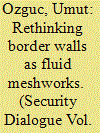|
|
|
Sort Order |
|
|
|
Items / Page
|
|
|
|
|
|
|
| Srl | Item |
| 1 |
ID:
189379


|
|
|
|
|
| Summary/Abstract |
Despite a growing interest in posthuman theory within political geography over the last two decades, the sub-disciplinary focus of critical border studies has seen a slower engagement with more-than-human entanglements. In this introductory paper to the special section, we ask whether the militarisation of borderlands, increasing surveillance of mobility, growing violence against refugees and asylum seekers, pandemic bordering, and mass displacement can be fully grasped through a singular focus upon the agency of the human subject. In addressing these questions, we challenge what we see as an anthropocentric preoccupation of existing scholarship in critical border studies and argue that the border is a constantly moving space that is created, maintained and/or dismantled by the entanglements of human and non-human lives and things. Our aim in bringing posthuman conversations into critical border studies is to explore different methods and questions that challenge binary constructions in our understandings of borders. In our response to these challenges, within this opening piece, we map three areas of debate: rethinking the heterogeneity of more-than-human borders; studying the agency of ‘things’ of the border; and finally, considering dehumanising practices of border politics. We suggest that the scholarship on more-than-human borders can be seen as a ‘minor literature’ that calls for a genuine realisation of forgotten and suppressed languages, voices, and knowledges.
|
|
|
|
|
|
|
|
|
|
|
|
|
|
|
|
| 2 |
ID:
189384


|
|
|
|
|
| Summary/Abstract |
More-than-human approaches to borders unsettle the anthropocentric reading of borders and bordering practices. They call for radically different imaginings of shared vulnerabilities and co-existence on the border. What remains marginal in these discussions is the way in which more-than-human borders continue to neglect social differences and unequal power relations among different (human) individuals. The question is not simply about the hierarchy between human and non-human lives, but how the construction of such binaries continues to privilege the life of certain humans while exposing their pervasive violence on others. Using the case of the development of Trans Frontier Conservation Areas (TFCAs) in southern Africa, we argue that limiting the voice of the human in our readings of the border to create space for non-humans could draw attention away from significant political analysis of mobility privileges and practices of ongoing colonisation in the construction of more-than-human spaces. By drawing on Henri Bergson’s political philosophy of becoming and of open and closed societies, we suggest that more-than-human borders can be re-thought in terms of Bergson’s reading of movement, qualitative multiplicity, and open societies – a language that resists any forms of closure and a linear understanding of progress and time. A close examination of TFCAs suggests that practices that seek to enable connectivity and mobility across time and space can turn borders into spatio-temporal chokepoints, which preserve the familiar logics of colonisation and exclusionary bordering.
|
|
|
|
|
|
|
|
|
|
|
|
|
|
|
|
| 3 |
ID:
180207


|
|
|
|
|
| Summary/Abstract |
We tend to see border walls as stable concrete fortifications. This article seeks to offer an alternative understanding of walls by suggesting a shift in border studies from network thinking to meshwork thinking. Despite references to multiplicity, concepts of networks and assemblages in border studies continue to provide neat narratives of walls. This article reimagines the border beyond sovereign–disciplinary–biopolitical networks and assemblages. It argues that border walls are constituted by and constitutive of the ever-shifting transformative movements of lines: colonizing lines, crack lines and lines of flight. By tracing the lines of the Separation Wall in the West Bank, this article reveals that, on the border, all these lines coexist, entangle with one another, and in their entanglements, they alter each other to form a fluid meshwork. Meshwork thinking shows the constant mobility of the border and shifts our attention to the power of molecular movements beneath the state in creating, sustaining and disrupting power politics. By presenting a less state-centric, more complex picture of the Separation Wall, this article aims to highlight the movement of the lines that transform the border into a meshwork.
|
|
|
|
|
|
|
|
|
|
|
|
|
|
|
|
|
|
|
|
|